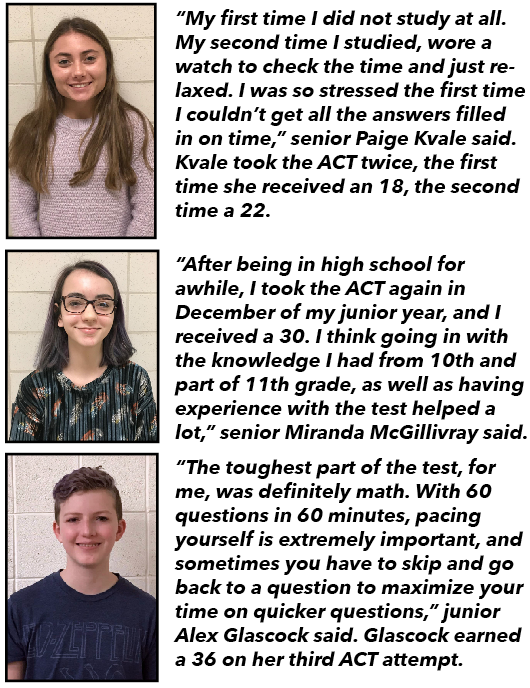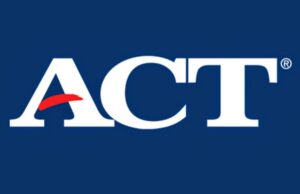Students offer tips for finding success on ACT

 The ACT is standardized timed test that most students dread to take, yet it’s the one way ticket to the college of your choice and college scholarships. The ticking time bomb, endless sets of bubbles to fill in and the biting fear in the back of the test taker’s mind of not getting a high enough score for the college one aspires to go to, create stress and anxiety before and while taking the ACT.
The ACT is standardized timed test that most students dread to take, yet it’s the one way ticket to the college of your choice and college scholarships. The ticking time bomb, endless sets of bubbles to fill in and the biting fear in the back of the test taker’s mind of not getting a high enough score for the college one aspires to go to, create stress and anxiety before and while taking the ACT.
Time is a strain for many test takers of the ACT. “The toughest part of the test, for me, was definitely math. With 60 questions in 60 minutes, pacing yourself is extremely important, and sometimes you have to skip and go back to a question to maximize your time on quicker questions,” junior Alex Glascock said. Going into the test blind, Glascock received a 34 on her first try, and with the help of the ACT guide book and practice test, Glascock went up two points, giving her a perfect score of 36 on her third try.
But, there doesn’t have to be a stigma that follows the ACT. Instead of walking into the test with trembling fingers and a storm of negative festering thoughts in one’s heads, one should go in confident. Walking in with a broad chest and emanating confidence can make one feel more relaxed and ready, resulting in higher test scores.
In a research study done at the University of Iowa, college students were divided into high confidence groups and low confidence and performed a test. Through peer evaluations and test results, the researchers determined that the higher confidence groups performed better than the lower confidence groups.
Confidence is not always something that people can just pull out of their bags, like pencils. Many test takers said they did not have the confidence their first time taking the ACT, but they built it up with experience and knowledge. “After taking it the first time, I realized it wasn’t as scary as I thought. For my next two tests, I went in with a much calmer mindset. I also realized that the type of loose preparation I did for the first test was no benefit whatsoever,” Gascock said.
The ACT benefits students by its allowance of unlimited attempts. It differs from a test at school because the score one receives on one attempt doesn’t have to be the final score. One has multiple chances, and this can be a positive thought in a test taker’s mind that makes the test go a bit smoother. “Just relax. You can retake this test if you need to, or if you are stuck on one question, don’t spend longer than a minute on it. Leave it blank and come back to it when you fill the rest in,” Kvale said. Kvale utilized this positive trait of the ACT and took the ACT twice, and the second time received a score she was happy with.
Taking the ACT multiple times can also be beneficial because one can take it at different knowledge points of high school. Taking the test as a sophomore is good for experience, even though one may not have all the knowledge to answer all the questions.
“After being in high school for awhile, I took the ACT again in December of my junior year, and I received a 30. I think going in with the knowledge I had from 10th and part of 11th grade, as well as having experience with the test helped a lot,” senior Miranda McGillivray said.
McGillivray took the test the first time as a freshman for experience and then multiple times later in high school. Taking the test multiple times also allows one to work on the timing and get more familiar with the format of the test.
Each ACT test provides the same general prompts/questions, but they can be presented in a different way for each test taker. Thus, taking the test multiple times is beneficial to a student because the second or third time one takes the test, the information can be presented in a way one may better understand.
“One piece of advice I would give to others is that if you can, you should take the ACT as many times as you want to. If you think you can do better, it’s very likely that you can. While I reached my goal score of 30 in the beginning of my junior year, I still took the ACT again in June, and my score increased to a 31. One of my friends also took the test three times and received a 30, 29 and then a 32. An increase in score by two points is uncommon, but the more you take the ACT, the more comfortable you will be, and the more likely it will be that the content of one of those tests will be easier for you than another,” McGillivray said.
Confidence is an important factor, but for the ACT, studying and focusing on what one struggles with most can also be key to the ACT score of one’s dreams. “After I took the ACT I realized my math score was bringing down my composite score, so I spent more time studying math content specifically and also took multiple small practice tests that were solely math. It was very helpful to study the subject I was weakest in, and my math score did increase,” Gillivray said.
Some students have the idea that the test is not worth studying for as they believe that the test doesn’t measure what one has learned, but natural intelligence and one’s ability to be a good test taker.
“School didn’t teach me anything important. Test taking skills are more important than what you can learn/study,” senior Megan Walsh said, but Glascock stressed that studying is always beneficial and can only improve one’s score.
“Definitely study. Some people say that not studying is the best way to approach the test, but studying can only improve your score, and knowing exactly what you’re going into is a major benefit. Especially in the writing section, knowing the ins and outs of the test and its format makes testing less stressful,” Glascock said.
Although the test does generate a lot of anxiety, fear and stress, both prior to and while taking the test, it’s good to keep in mind that the score that one receives does not determine one’s future, worth or intelligence.“Don’t stress as much. You are more than the ACT score,” senior Alexandria Dungeon said.









You must be logged in to post a comment Login